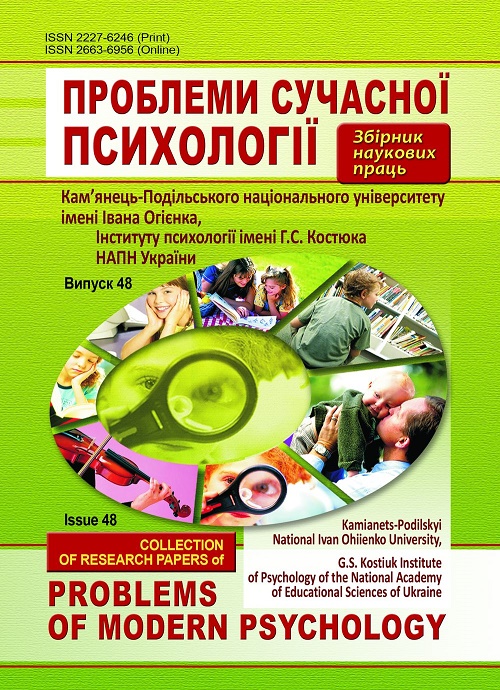Psychological Training of the Development of Personality’s Subjectivity at Adolescence
DOI:
https://doi.org/10.32626/2227-6246.2020-48.272-292Keywords:
a subject, subjectivity, a subject of mental activity, cognitive activity, a subject of psychological activity, psychological training of the development of personality’s subjectivity.Abstract
The purpose of our research is to develop a comprehensive training program for
the development of the personality’s subjectivity at school age.
Methods of the research. The following theoretical methods of the
research were used to solve the tasks formulated in the article: the categorical
method, the structural and functional methods, the methods of the analysis,
systematization, modeling, generalization.
The results of the research. It is noted that the category of «a subject» as
a qualitative characteristic of human activity determines the place and role of
the person in the world, his / her abilities to provide the activity, which actualize
the processes of self-determination and personal development. In Psychology a
subject is understood as a person who is the source of purposeful (and therefore –
conscious) activity, subordinated to the «image of the desired future», that is the
goal of personal development.
The concept of «the subject of mental activity» is considered to be the
key one for our research. It is stated that a person as a subject has a direct
regulatory effect on his / her own psyche and through the mediation of the
psyche he / she affects the surrounding world, and the mature subject is able
to become aware of his / her personality. A mature subject of mental activity
is an individual who is aware of himself / herself as a creator of his / her own
psyche, whose development, protection, restoration and correction (if it is
necessary) is consciously set for some purpose and have to be purposefully
exercised. Therefore, the mature subject of mental activity will reach the level of
the subject of mental activity; that is conscious regulation, as well as reflection
being its constituent, which are the criterion that distinguish these two levels
of subjectivity. It is emphasized that the individual can be the subject of mental
activity if the object is his / her own psyche in its functioning and development.
It is proved that the subject appears in a case of awareness of the object. It
is emphasized that it is impossible to realize the object without reflection,
therefore, there is no subject without reflection.
There were developed exercises of training program for the development
of the personality’s subjectivity at the adolescence.
Conclusions. It was proved that for a purposeful influence on the
development of a teenager, his / her cognitive activity, teachers would clearly
present for themselves the image of subjectivity, which was reflected in certain
aspects of the activity, such as: conditioned mental image of gained experience,
needs, attitudes, emotions, goals and motives, having been determined by
manageability and selectivity of pupils’ activity. To become a subject involves the
emergence of processes of the development and prioritization of goals, problems
and choices regarding the solution and formulation of tasks and solutions. So,
subjectivity is purely socio-cultural unit in nature, since the ultimate cause of
individual’s actions is always characterized in time, space, meaning, and among
direct and indirect participants in the activity.
References
Абульханова-Славская К. А. О субъекте психической деятельности. Мо-сква : Наука, 1993. 287 с.
Брушлинский А. В. Проблемы психологии субъекта. Москва : Институт психологии РАН, 1994. 109 с.
Максименко С., Ткач Б., Литвинчук Л., Онуфрієва Л. Нейропсихо-лінгвістичне дослідження політичних гасел із зовнішньої реклами. Psycholinguistics. Психолінгвістика. Психолингвистика. 2019. № 26 (1). С. 246–264. URL : https://psycholing-journal.com/ index.php/journal/article/view/715.
Михальчук Н. О. Діалогічна взаємодія школярів з іншомовним текстом в детермінації становлення їх суб’єктності. Оновлення змісту, форм та методів навчання і виховання в закладах освіти: Зб. наук. праць «Наукові записки РДГУ». Рівне, 2008. Вип. 41. С. 127–133.
Рудестам Н. Групповая психотерапия. Москва, 1990. С. 74–75.
Татенко В. О. Суб’єкт психічної активності: природа, функції, розви¬ток. Психологія суб’єктної активності особистості. Київ : Інститут психології АПН України, 1993. С. 91–93.
Титов В. М. Методологічні проблеми взаємовідношення суб’єкта і ді-яльності. Актуальні проблеми психології: традиції і сучасність. Матеріали конференції. Київ, 1993. Т. 3. С. 142–149.
Harre, R. (1983). Personal being. Oxford : Blackwell. 56 p.
Downloads
Published
How to Cite
Issue
Section
License
Copyright
The Editorial Board has the full right to publish original scientific papers containing results of theoretical and experimental research works which are not currently subject to review for publication in other scientific editions. The Author shall transfer to the editorial board of the Collection the right to spread the electronic version of the paper, as well as the electronic version of the paper translated into English (for papers originally submitted in Ukrainian and Russian) by all kinds of electronic means (placement at the official website of the Collection, electronic databases, repositories etc).
The Author of an article reserves the right to use materials of the paper, without approval with the editorial board and the founders of this Collection: a) partially or fully, for educational purposes; b) for writing own dissertation papers; c) for preparation of abstracts, conference reports and presentations.
The Author of an article can place electronic copies of the paper (including the final electronic version downloaded from the official website of the Collection) at:
- personal web resources of all Authors (websites, webpages, blogs etc.);
- web resources of the institutions where the Authors are employed (including electronic institutional repositories);
- non-profit public access web resources (for example, arXiv.org).
But in all cases, it is obligatory to have a bibliographic reference to the paper, or a hyperlink to its electronic copy placed at the official website of this Collection.






